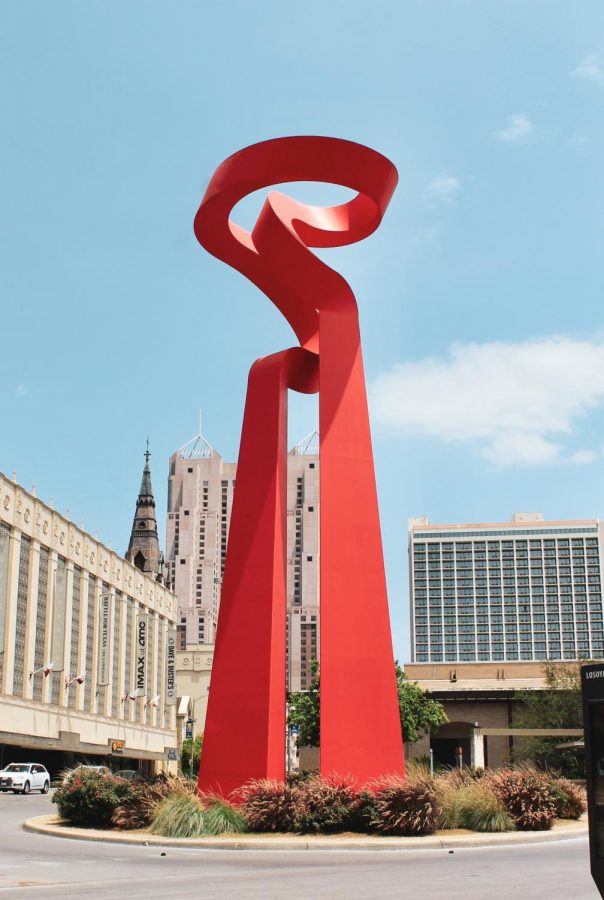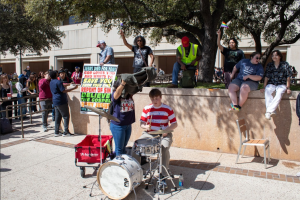Panel discusses the economic impact of COVID-19 in San Antonio
The Torch of Friendship sculpture in downtown San Antonio. San Antonio’s tourism industry is one of those being hit hardest economically by the pandemic.
May 6, 2020
Economic experts from UTSA discussed the economic impact of the coronavirus pandemic in a virtual panel on April 22. The panelists included Tom Tunstall, senior director of research for the Institute for Economic Development; Richard Sifuentes, director of the Small Business Development Center; Pamela Smith, an accounting professor and associate dean of administration and faculty; and Michael Villarreal, director of the Urban Education Institute. The panelists discussed short- and long-term effects of the pandemic on Texas revenue sources, challenges for small business owners, rebuilding San Antonio’s workforce for a new era, economic and public policy concerns and the impact on health care and tax policies, as well as education.
Tunstall started the conversation by providing statistics, mentioning that the projected national unemployment rate is 17% — a figure which continues to rise — and the crude oil price took a nosedive into negative figures for the first time in history at -$37.60 per barrel of oil.
Tunstall said the latter figure will be felt more in cities like Houston, where “probably almost 50% of their economy is driven by the oil and gas industry,” rather than San Antonio.
All four panelists agreed that the tourism and restaurant industries, along with the other small, “mom-and-pop” businesses of San Antonio, will bear the economic brunt of this pandemic. To help combat this, the UTSA Small Business Development Center (SBDC) is currently providing guidance and information to help small businesses consider their options. In order to find out more about their COVID-19 business resources guide, businesses are encouraged to visit their webpage. According to Sifuentes, the SBDC is also currently assisting those applying for Economic Injury Disaster Loan and/or the Payment Protection Program Loan to relieve some financial burden.
Smith then delved into the topics of federal relief incentives and personal tax deductions and stated that 401(k) withdrawal may not incur the 10% penalty for those under the age of 59 during this unprecedented period.
“It applies to individuals who have been diagnosed with COVID-19, or are suffering adverse financial consequences, such as a layoff, a closure or reduced work hours,” Smith said.
She then began to discuss the importance of the sales tax to San Antonio, as it makes up more than 58% of the city’s budget. With sales tax revenue dwindling across the state and city, major budget cuts are projected to take place sooner or later. Needless to say, public ventures such as infrastructure and transportation projects, along with public schools and universities, will need to brace for some of the negative ramifications of budget cuts.
Moreover, Villarreal mentioned that he could see “budget cuts in public education, K-12, anywhere between 15% to 25%, and in higher education from 10% to 15%.” He stated that the Texas legislature could balance the state’s budgets when it meets for its 2021 legislative session by either raising taxes, eliminating previous tax cuts, making public spending cuts across the state or tapping into the Texas Economic Stabilization Fund — the “Rainy Day” fund — although Villarreal said the use of this fund has become politicized. He also predicted the budget cuts for education institutions would be notably higher than in 2008 during the Great Recession.
During the virtual panel, a viewer asked about the possibility of a second wave of COVID-19 hitting the nation, and all four panelists echoed that, during an unprecedented time like this, forecasting is a treacherous business. The panelists emphasized that in order to minimize the ramifications of this pandemic and get everyone back on track, everyone needs to put their health first.
“A healthy society will translate to a vibrant economic society,” Villarreal said.
Smith then followed with a statement to encourage people to shop at local businesses — the moms-and-pops — and help areas in need of food, like the San Antonio Food Bank.
Villarreal said that, as has happened during previous challenging times, San Antonio is going to come out stronger than ever. He said this episode has highlighted a lot of weaknesses in our society, like the health care systems, access to education, and many more, and the city can learn from these problems to be more adaptive and flexible. Smith remarked that only by stepping out of its comfort zone will the city tap into innovation and switch on its entrepreneurial mindset.
To learn more about tax incentives, Smith suggested using the Internal Revenue Service website, as it has several FAQs and information about those incentives and other resources. Not only that, but Smith also said the website has an easy user interface and uses minimal jargon so everyone can understand. Sifuentes, on the other hand, recommended the Texas Workforce Commission website, as it relates more to Texas workforce and employment.







